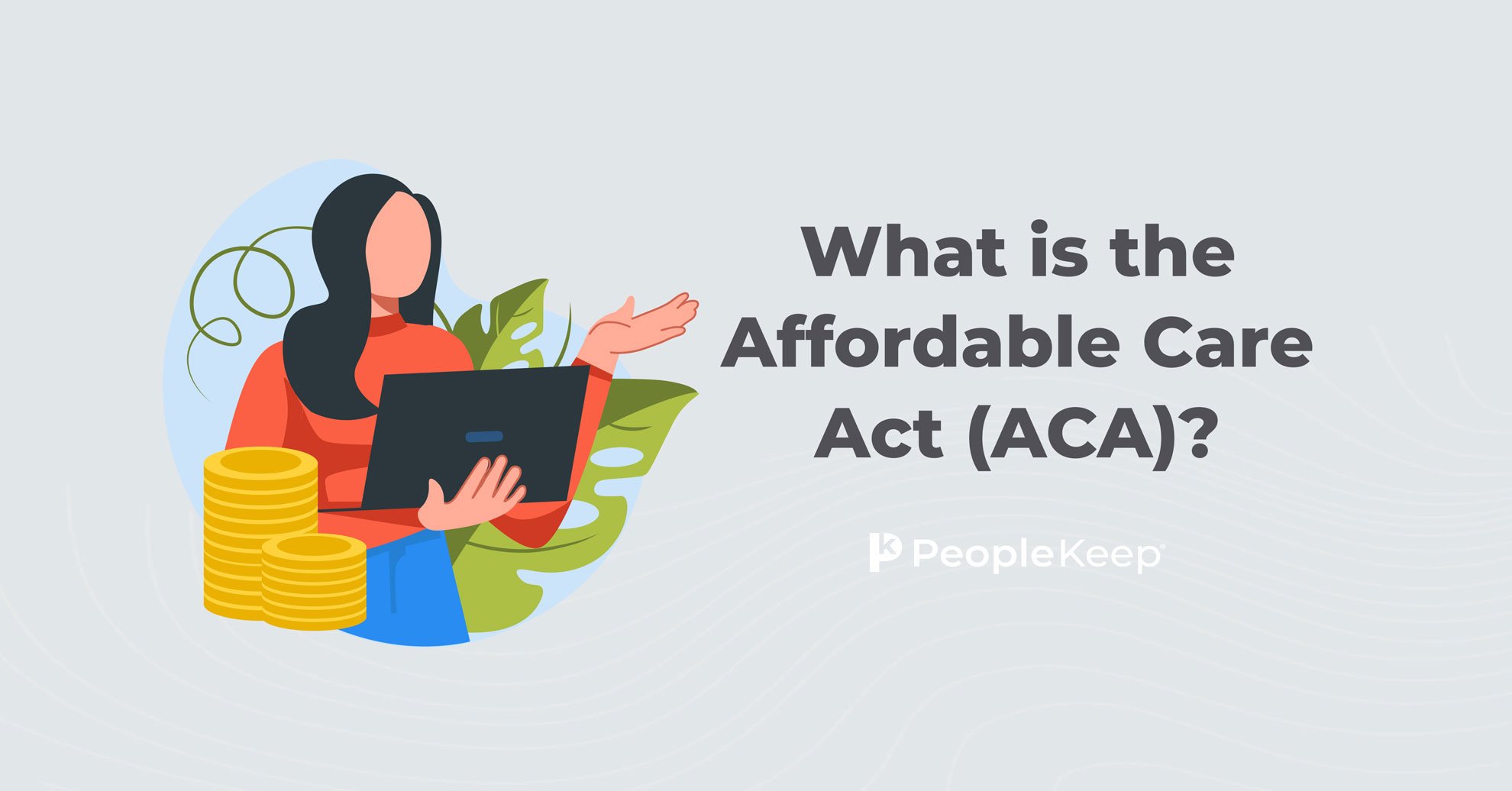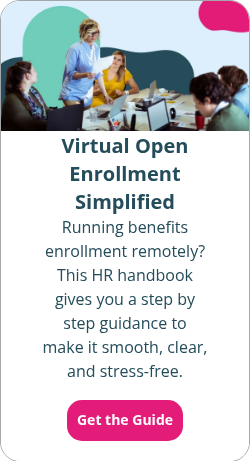What is Open Enrollment?
By Elizabeth Walker on August 8, 2025 at 11:00 AM
As each year approaches its end, employers and employees must start planning for the new year — and choosing their health coverage is no exception. November and December are generally the designated times for Americans to change their individual health insurance plans for the upcoming year. This time is known as Open Enrollment Period.
If you’re offering a health benefit that allows your employees to choose their own coverage on the individual market, you and your employees must know the enrollment deadlines and procedures.
This article will explain everything you need to know about the Open Enrollment Period so you and your staff can make smart, timely decisions about your health insurance coverage.
In this blog post, you’ll learn:
- What Open Enrollment is, including key dates and recent changes to federal rules.
- What employers must do to prepare for Open Enrollment when offering a health reimbursement arrangement (HRA).
- What options are available if employees miss open enrollment or want to opt out.
What is Open Enrollment?
Open Enrollment is the annual period during which Americans can enroll in, renew, or change their individual health insurance coverage. The federal government implemented Open Enrollment Period as part of the Affordable Care Act (ACA). The ACA also created public health exchanges, including the federal Health Insurance Marketplace and state-based exchanges.
An open enrollment window ensures that individuals and families don’t wait until they get sick to get health insurance. It also prevents individuals from switching their current plan to a more comprehensive policy before undergoing an expensive medical procedure.
Instead, it streamlines the health insurance shopping process by giving consumers a guaranteed time to change their marketplace plans.
Other reasons individuals may want to review their coverage choices include:
- They want to change their provider networks.
- They need greater prescription drug coverage or specialized medical services.
- They’re applying for premium tax credits and other subsidies.
When is Open Enrollment?
Currently, Open Enrollment dates vary depending on your state. For example, California, the District of Columbia, Massachusetts, New Jersey, New York, and Rhode Island allow residents to enroll in coverage from November 1 through late January. But generally, the annual enrollment window in most states starts on November 1 and ends on January 15.
However, a recent CMS final rule has changed the Open Enrollment process1. Effective starting the 2026 Open Enrollment Period for 2027 coverage, the dates to enroll in coverage will begin on November 1 and end on December 15 for all states with public exchanges operating on the federal Health Insurance Marketplace. State-based exchanges will also have to shorten their annual enrollment period to end by December 31.
Individual consumers who enroll by December 15 and pay their first monthly insurance premium will have active health coverage beginning on January 1, 2027.
What do employers who offer an HRA need to do during Open Enrollment?
Many small and medium-sized businesses (SMBs) don’t have a group plan due to the annual rate hikes, participation requirements, and costly monthly premiums.
If you don’t meet the minimum rate (which is typically 70%), you may have to explore alternative options to group plans. In many states, small organizations can buy a small group health plan through the Small Business Health Options Program (SHOP).
Or, small employers can opt for a health reimbursement arrangement (HRA) as an alternative to group health insurance. By opting for an HRA, SMBs can better control their budget and give their employees greater flexibility over their healthcare.
If you provide a stand-alone HRA, you can avoid offering a one-size-fits-all group plan for your employees. Instead, they choose the individual health coverage and other out-of-pocket medical expenses that work best for them, and you reimburse them tax-free up to a set monthly allowance amount that you predetermine.
An employer’s greatest responsibility during Open Enrollment is keeping employees informed of pertinent dates and details regarding their health benefits. If your staff doesn’t make their elections and enroll in an individual plan during the annual window provided, they can’t get new coverage or change their existing coverage until the following year, or if they qualify for a special enrollment period.
You should communicate with your staff members about Open Enrollment early and often. For example, it’s good practice to notify employees at least one month before the annual enrollment window opens so they have time to prepare and review their coverage.
All you need to do is make the following information readily available to your employees:
- Open Enrollment dates
- The enrollment platforms where they can review coverage options and buy a health plan.
- This could be the federal Health Insurance Marketplace, a state-based market, or letting them know they can buy a plan directly from an insurance carrier.
- If your company works with a health insurance broker, you should also share that information with your employees.
- The HRA allowance you’re offering them so they can choose a health plan and budget for their monthly premium.
- Remind employees to secure proper documentation so they can attest they have qualifying health coverage.
- Employees with a qualified small employer HRA (QSEHRA) must buy a health plan that meets minimum essential coverage (MEC) to participate in the benefit.
- The individual coverage HRA (ICHRA) requires employees to have a qualifying form of individual health coverage.
- What qualifying life events trigger a special enrollment period.
If you offer an HRA through PeopleKeep by Remodel Health, our award-winning customer support team and user-friendly HRA administration software will help you keep your employees informed through automated communications, in-app messages, and live chat sessions. Plus, employees can compare and shop for individual health plans from their PeopleKeep accounts.
What if an employee misses Open Enrollment?
If an employee misses the annual enrollment window, a few things may happen. If they already had coverage, their insurance provider may automatically enroll them in the same plan for the following year. HealthCare.gov may also automatically enroll them in a similar marketplace plan if their current policy is no longer available2. Only some state-based exchanges do this automatically.
If the employee never had coverage, they can’t enroll in a health plan until the next Open Enrollment Period. The only exception is if an employee experiences a qualifying life event. In this case, the employee would trigger a special enrollment period, giving them 60 days from the qualifying event to enroll in a new plan or change their current policy outside of Open Enrollment.
Employees without permanent coverage who miss Open Enrollment can also buy a short-term health insurance plan on a private health exchange, such as from a broker or an insurer. However, short-term health plans are temporary, have limited coverage, and don’t meet the standards that ACA marketplace plans must provide.
Offering new health benefits coverage, like an HRA, is a major life change that triggers a special enrollment period, no matter what time of year. Employees have 60 days starting from when you first offered them the HRA to enroll in an individual health plan so they can participate in the benefit. So, if you offer an HRA outside of Open Enrollment, your employees still have a chance to compare their options and enroll in a plan.
What if an employee wants to opt out of coverage?
Open Enrollment also allows those who no longer want coverage to cancel it. This is similar to an employer-sponsored group plan’s annual enrollment period, where employees already covered by a spouse’s or parent’s plan, older workers enrolling in Medicare, or those who simply don’t want health coverage can opt out. However, they can only opt out during the annual enrollment period or if they have a qualifying life change.
With ICHRA benefits administration powered by PeopleKeep, we keep records of employees’ opt-in and opt-out decisions for you. But keep in mind, employees can’t opt out of a QSEHRA.
Conclusion
Making decisions about health insurance can be time-consuming and confusing for employers and employees. That’s why it’s essential to do your research before Open Enrollment, review your company’s coverage, and ensure you’re offering the best benefits package possible to keep your staff happy.
If you’re an SMB interested in offering an HRA, PeopleKeep by Remodel Health can help! We can set you up with an easy-to-manage health benefit for your business that doesn’t break your budget. Ready to get started? Schedule a call with us today to learn more about designing a personalized HRA for your employees.
This article was originally published on November 9, 2020. It was last updated on August 8, 2025.
References
1. Patient Protection and Affordable Care Act; Marketplace Integrity and Affordability
Check out more resources
See these related articles

How to switch to your spouse's health insurance policy
Want to switch to your spouse’s health insurance? Learn when you can add a spouse to a policy, qualifying events, and steps to avoid coverage gaps.

What happens if you miss Open Enrollment for individual health insurance?
Missed Open Enrollment for health insurance? Find out what options you have, including qualifying life events and special enrollment periods (SEPs).

What is the Affordable Care Act (ACA)?
The Affordable Care Act (ACA) expanded access to health insurance. Learn what the ACA is, what it requires, and how it impacts individuals and employers.




